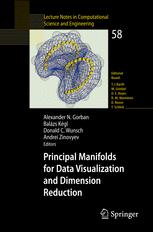

Most ebook files are in PDF format, so you can easily read them using various software such as Foxit Reader or directly on the Google Chrome browser.
Some ebook files are released by publishers in other formats such as .awz, .mobi, .epub, .fb2, etc. You may need to install specific software to read these formats on mobile/PC, such as Calibre.
Please read the tutorial at this link: https://ebookbell.com/faq
We offer FREE conversion to the popular formats you request; however, this may take some time. Therefore, right after payment, please email us, and we will try to provide the service as quickly as possible.
For some exceptional file formats or broken links (if any), please refrain from opening any disputes. Instead, email us first, and we will try to assist within a maximum of 6 hours.
EbookBell Team

5.0
100 reviewsIn 1901, Karl Pearson invented Principal Component Analysis (PCA). Since then, PCA serves as a prototype for many other tools of data analysis, visualization and dimension reduction: Independent Component Analysis (ICA), Multidimensional Scaling (MDS), Nonlinear PCA (NLPCA), Self Organizing Maps (SOM), etc. The book starts with the quote of the classical Pearson definition of PCA and includes reviews of various methods: NLPCA, ICA, MDS, embedding and clustering algorithms, principal manifolds and SOM. New approaches to NLPCA, principal manifolds, branching principal components and topology preserving mappings are described as well. Presentation of algorithms is supplemented by case studies, from engineering to astronomy, but mostly of biological data: analysis of microarray and metabolite data. The volume ends with a tutorial "PCA and K-means decipher genome". The book is meant to be useful for practitioners in applied data analysis in life sciences, engineering, physics and chemistry; it will also be valuable to PhD students and researchers in computer sciences, applied mathematics and statistics.